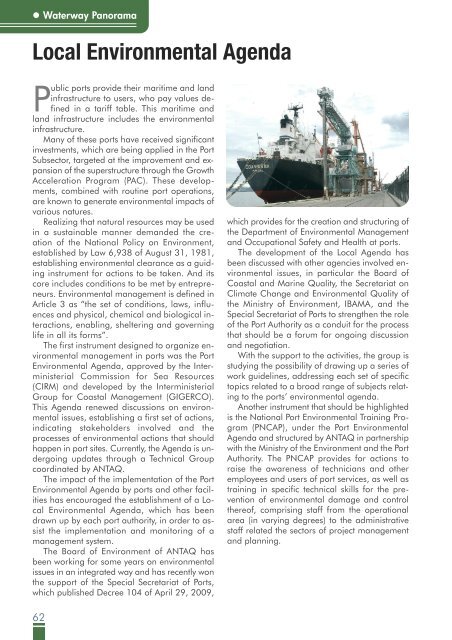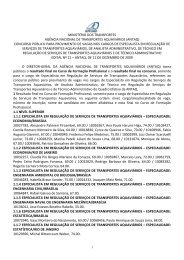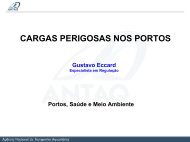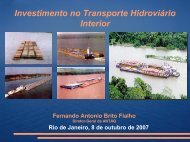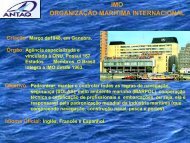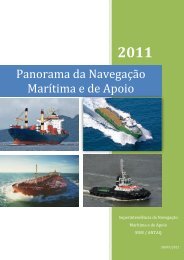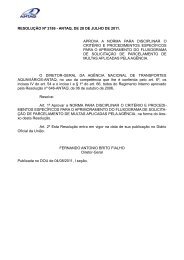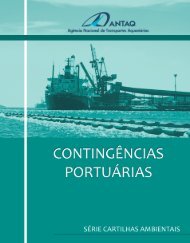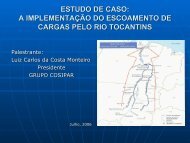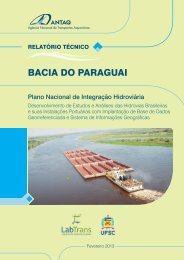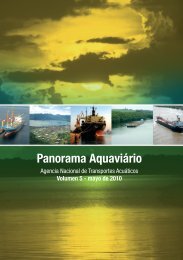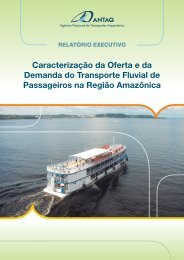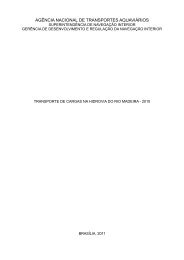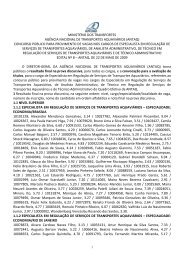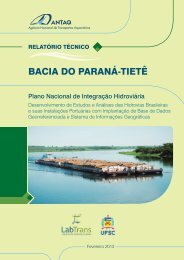Waterway Panorama - Antaq
Waterway Panorama - Antaq
Waterway Panorama - Antaq
Create successful ePaper yourself
Turn your PDF publications into a flip-book with our unique Google optimized e-Paper software.
l <strong>Waterway</strong> <strong>Panorama</strong><br />
Local Environmental Agenda<br />
Public ports provide their maritime and land<br />
infrastructure to users, who pay values defined<br />
in a tariff table. This maritime and<br />
land infrastructure includes the environmental<br />
infrastructure.<br />
Many of these ports have received significant<br />
investments, which are being applied in the Port<br />
Subsector, targeted at the improvement and expansion<br />
of the superstructure through the Growth<br />
Acceleration Program (PAC). These developments,<br />
combined with routine port operations,<br />
are known to generate environmental impacts of<br />
various natures.<br />
Realizing that natural resources may be used<br />
in a sustainable manner demanded the creation<br />
of the National Policy on Environment,<br />
established by Law 6,938 of August 31, 1981,<br />
establishing environmental clearance as a guiding<br />
instrument for actions to be taken. And its<br />
core includes conditions to be met by entrepreneurs.<br />
Environmental management is defined in<br />
Article 3 as “the set of conditions, laws, influences<br />
and physical, chemical and biological interactions,<br />
enabling, sheltering and governing<br />
life in all its forms”.<br />
The first instrument designed to organize environmental<br />
management in ports was the Port<br />
Environmental Agenda, approved by the Interministerial<br />
Commission for Sea Resources<br />
(CIRM) and developed by the Interministerial<br />
Group for Coastal Management (GIGERCO).<br />
This Agenda renewed discussions on environmental<br />
issues, establishing a first set of actions,<br />
indicating stakeholders involved and the<br />
processes of environmental actions that should<br />
happen in port sites. Currently, the Agenda is undergoing<br />
updates through a Technical Group<br />
coordinated by ANTAQ.<br />
The impact of the implementation of the Port<br />
Environmental Agenda by ports and other facilities<br />
has encouraged the establishment of a Local<br />
Environmental Agenda, which has been<br />
drawn up by each port authority, in order to assist<br />
the implementation and monitoring of a<br />
management system.<br />
The Board of Environment of ANTAQ has<br />
been working for some years on environmental<br />
issues in an integrated way and has recently won<br />
the support of the Special Secretariat of Ports,<br />
which published Decree 104 of April 29, 2009,<br />
which provides for the creation and structuring of<br />
the Department of Environmental Management<br />
and Occupational Safety and Health at ports.<br />
The development of the Local Agenda has<br />
been discussed with other agencies involved environmental<br />
issues, in particular the Board of<br />
Coastal and Marine Quality, the Secretariat on<br />
Climate Change and Environmental Quality of<br />
the Ministry of Environment, IBAMA, and the<br />
Special Secretariat of Ports to strengthen the role<br />
of the Port Authority as a conduit for the process<br />
that should be a forum for ongoing discussion<br />
and negotiation.<br />
With the support to the activities, the group is<br />
studying the possibility of drawing up a series of<br />
work guidelines, addressing each set of specific<br />
topics related to a broad range of subjects relating<br />
to the ports’ environmental agenda.<br />
Another instrument that should be highlighted<br />
is the National Port Environmental Training Program<br />
(PNCAP), under the Port Environmental<br />
Agenda and structured by ANTAQ in partnership<br />
with the Ministry of the Environment and the Port<br />
Authority. The PNCAP provides for actions to<br />
raise the awareness of technicians and other<br />
employees and users of port services, as well as<br />
training in specific technical skills for the prevention<br />
of environmental damage and control<br />
thereof, comprising staff from the operational<br />
area (in varying degrees) to the administrative<br />
staff related the sectors of project management<br />
and planning.<br />
62


